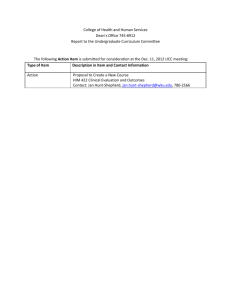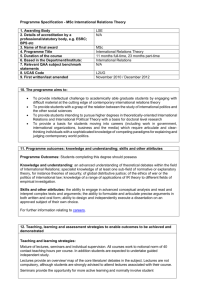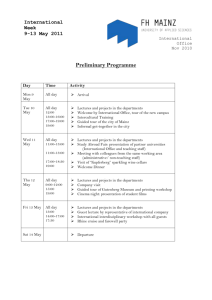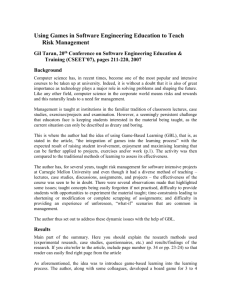Healthcare Governanc.. - Loughborough University
advertisement
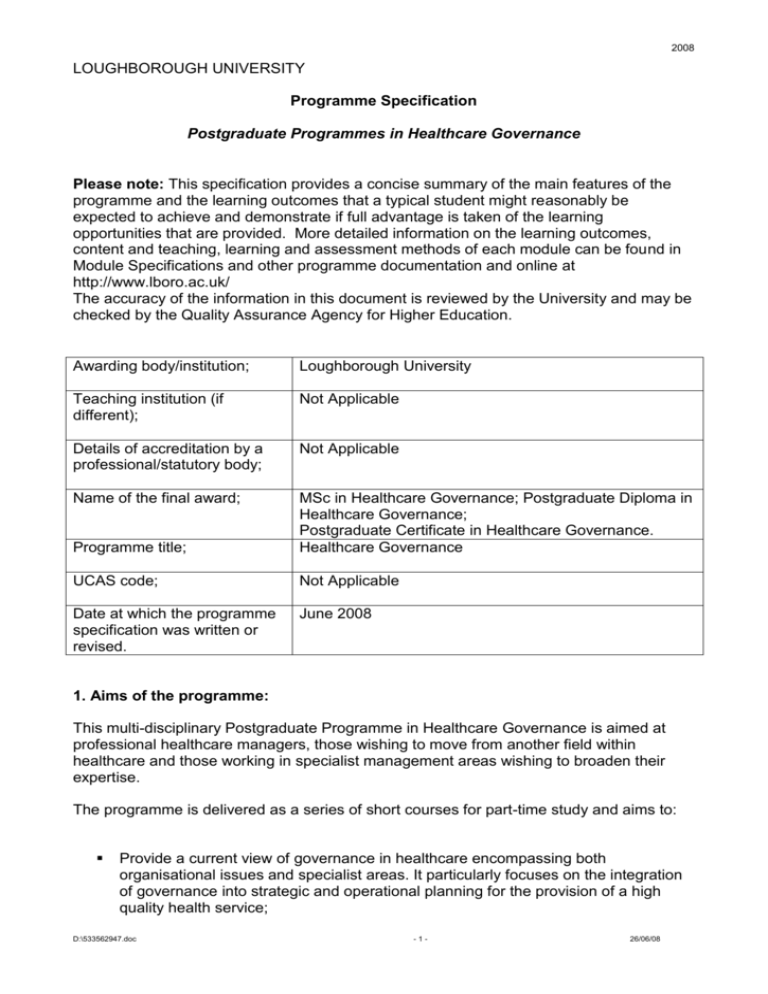
2008 LOUGHBOROUGH UNIVERSITY Programme Specification Postgraduate Programmes in Healthcare Governance Please note: This specification provides a concise summary of the main features of the programme and the learning outcomes that a typical student might reasonably be expected to achieve and demonstrate if full advantage is taken of the learning opportunities that are provided. More detailed information on the learning outcomes, content and teaching, learning and assessment methods of each module can be found in Module Specifications and other programme documentation and online at http://www.lboro.ac.uk/ The accuracy of the information in this document is reviewed by the University and may be checked by the Quality Assurance Agency for Higher Education. Awarding body/institution; Loughborough University Teaching institution (if different); Not Applicable Details of accreditation by a professional/statutory body; Not Applicable Name of the final award; Programme title; MSc in Healthcare Governance; Postgraduate Diploma in Healthcare Governance; Postgraduate Certificate in Healthcare Governance. Healthcare Governance UCAS code; Not Applicable Date at which the programme specification was written or revised. June 2008 1. Aims of the programme: This multi-disciplinary Postgraduate Programme in Healthcare Governance is aimed at professional healthcare managers, those wishing to move from another field within healthcare and those working in specialist management areas wishing to broaden their expertise. The programme is delivered as a series of short courses for part-time study and aims to: Provide a current view of governance in healthcare encompassing both organisational issues and specialist areas. It particularly focuses on the integration of governance into strategic and operational planning for the provision of a high quality health service; D:\533562947.doc -1- 26/06/08 2008 Develop participants knowledge, increase job competencies and develop professional potential; and Suit the needs of working professionals who do not have an opportunity for full-time study. 2. Relevant subject benchmark statements and other external and internal reference points used to inform programme outcomes: The Programme conforms to the benchmarks published by the Quality Assurance Agency for Higher Education in respect of Masters awards in business and management in 2002. Specifically the programme meets the requirements of a specialist programme for career development in that it is intended to prepare health professionals for a specialist career pathway. The following reference points also provide a benchmark for programme development, delivery and content. University and departmental teaching and learning strategies Staff research and professional development within the discipline Links, thorough consultancy and past students, with a range of healthcare organisations Consultation with acknowledged experts in the subject Links with the external examiner 3. Intended Learning Outcomes The programme is delivered through a combination of short lectures, individual and group exercises, workshops, role-play and practical sessions. The modules are highly participative encouraging students to contribute to class discussions and to share personal experiences and concerns with fellow students. Students are also encouraged to consider situations within their own work environments. The Programme Director acts in the capacity of a personal tutor and provides students with advice and guidance on academic progress and study problems. Students are required to work both individually and within groups for both study and assessment. A programme handbook is available to each student at the beginning of the programme. The handbook sets out general advice on study, key regulations on assessment, programme regulations and module specifications for all modules available for study. At each module, further information is provided including a module outline which details the lecture schedule and associated reading guidance. Knowledge and Understanding: On successful completion of this programme, students should be able to demonstrate knowledge and understanding of: The framework of governance in healthcare will be taught by means of short lectures, group work and discussion with examples of systems and structures being given by the lecturers. D:\533562947.doc -2- 26/06/08 2008 Tools and techniques used in healthcare governance will be taught by means of lectures, case studies and syndicate exercises. Governance principles and practice relevant to the healthcare sector will be taught by means of case study analysis, lectures and group work. The emphasis in this element will be upon enabling the students to develop critical thinking in respect of the application of general principles to particular situations. Systems and healthcare governance will be taught by means of lecture and case study review. An overview of systems theory in healthcare will form an integral part of the teaching of this element. Research methodology will be taught by means of lectures, group work and syndicate discussions. The essentially individual nature of research undertaken by students will necessitate the support of much of the formal teaching by guided study and reading and individual work within the tutorial sessions. Teaching, learning and assessment strategies to enable outcomes to be achieved and demonstrated: In seeking to attain all of the above intended learning outcomes students will be encouraged to make use of on-line sources of information and directed reading. The assessment of these intended learning outcomes will take the form of in–class tests, essays and a report (in respect of Research methodology) and the MSc dissertation (for MSc Candidates). Skills and other attributes: a. Subject-specific cognitive skills On successful completion of this programme, students should be able to: Identify methods for establishing an effective and integrated governance system. This will be taught by means of lectures and group work including the analysis of case study materials and presentation of results Assess a range of risk assessment tools and select the most appropriate for use in given situations will be taught by means of short lectures and analysis of case study materials. Critically analyse healthcare governance issues and present possible intervention strategies will be taught by means of short lectures, cases study analysis group work and syndicate exercises. Evaluate the effectiveness of any interventions this will be taught by means of lectures and short presentations, case study analysis and group work. The emphasis will be upon the development of a critical facility that will enable the selection of the most appropriate criteria for intervention evaluation. D:\533562947.doc -3- 26/06/08 2008 Guided reading and encouragement to use on-line data sources will also serve to enhance the attainment of all of these intended learning outcomes. Teaching, learning and assessment strategies to enable outcomes to be achieved and demonstrated: These intended learning outcomes will be assessed by work-based reports, in-class tests and group case study analysis b. Subject- specific practical skills On successful completion of this programme, students should be able to: Produce governance and related policies for their organization will be taught by means of lectures and guided discussions, group work and short presentations Use a range of risk assessment tools and carry out risk assessments within their own organization this will be taught by means of lecture, case study analysis and other group work. Devise and maintain systems for the collection of data on untoward incidents will be taught by means of lectures and case study review. Students will be encouraged to examine and evaluate the data collection systems within their own organization. This will be reinforced and supported within the tutorial sessions Develop effective risk control strategies for healthcare will be taught by means of group work and discussion, short lectures and case study evaluation. Emphasis will be placed upon the development of systems that are both robust and costeffective. Design a research tool appropriate to healthcare governance management will be taught by means of lectures, group work and guided reading. This will be supported by individual guided study facilitated by means of the tutorial sessions. Teaching, learning and assessment strategies to enable outcomes to be achieved and demonstrated: The intended learning outcomes will be assessed by Work-based reports and essay, in-class tests, the group presentations, the research methodology report and the MSc dissertation c. Key/transferable skills On successful completion of this programme, students should be able to: Establish management systems will be taught by means of lectures, group work and discussion and case study analysis. Guided reading will reinforce learning D:\533562947.doc -4- 26/06/08 2008 Communicate with a range of stakeholders will be taught by means of case study analysis and discussion , group work (including videoed group work), role play and short lectures. Motivate others to take action will be taught by means of lectures, case study analysis, group discussions and role play Present technical and complex concepts in a form which is understandable to managers will be taught by means of case study review, group work, role play and short lectures. Use information and communications technology appropriately in acquiring analyzing and communicating information will be taught by means of demonstrations, short lectures, group work and guided reading. Students will be encouraged further to access on-line data sources Develop research skills, including data collection and analysis will be taught by means of lectures, group work, case study analysis and guided reading. This will be enhanced and reinforced through tutorials Teaching, learning and assessment strategies to enable outcomes to be achieved and demonstrated: These intended learning outcomes will be assessed by means of work-based reports, group case study, in-class tests and group presentations. The research skills will be further assessed by means of the in-class test and in the Module BSP676 (research methodology) by written report and the MSc dissertation (MSc candidates only). In all instances teaching and learning methods will be modified where needed in accordance with feedback received from a variety of sources. Second marking group presentations: In respect of the issues relating to the second marking of group case study presentations and group presentations systems will be put into place to ensure that these requirements are complied with. The use of video will further enhance the process. 4. Programme structures and requirements, levels, modules, credits and awards: The award available is the MSc (180 credits) or Loughborough University Postgraduate Diploma (Postgraduate Diploma) (120 credits) or Loughborough University Postgraduate Certificate (Postgraduate Certificate) (60 credits) and is available only by part-time study. Full details can be found in the Programme Regulations at: http://www.lboro.ac.uk/admin/ar/lps/progreg/year/0809/docs/Healthcare%20Governance% 20MSc.doc D:\533562947.doc -5- 26/06/08 2008 5. Criteria for admission to the programme: Entry on to the programme prospective students should: Hold a degree from a HE institute of the UK; or Have achieved the academic requirements for corporate membership of a British chartered professional institution; or Hold any other relevant qualification and experience approved by the university Prospective students whose first language is not English must possess GCSE (or O level) English Language, or University Test in English (JMB) or Proficiency in English (Cambridge) or a Test of English as a Foreign Language (TOELF) score of 213 (or 550 under the old scheme) or an IELTS score of 6.5 or other qualifications acceptable to the University. 6. Information about assessment regulations Full information about the assessment regulations is contained in the programme regulations for each programme. The current regulations for all the Business School programmes can be accessed via the University web site which lists all at: https://internal.lboro.ac.uk/admin/registry/uniwide/2007-08%20Prog%20Regs/ The current regulations for each of the Business School programmes can also be directly accessed from section 6 of our comprehensive statement to supplement this programme specification which is available on our web site at: http://www.lboro.ac.uk/departments/bs/ug/progspec-6to9.html 7. What makes the Programme Distinctive The programme intends to develop managers who have an expertise and understanding in the issues of governance. The professional approach to governance will allow them to look at complex management issues with an enabling and empowering frame of mind, creating innovative solutions. The programme is specific in its purpose in that it intends to produce Board Members for the healthcare services (both private and public) within the UK for the coming decades. It will build upon the students’ professional knowledge and cause them to see governance as patient focused activity. This course prepares those managers aspiring to Board positions to have a much greater understanding of their future role. D:\533562947.doc -6- 26/06/08 2008 8. Particular support for learning Information about the support offered by the Business School for this programme and the general support offered by the University for all programmes can be found in section 8 of our comprehensive statement to supplement this programme specification which is available on our web site at: http://www.lboro.ac.uk/departments/bs/ug/progspec-6to9.html 9. Methods for evaluating and improving the quality and standards of learning The official University statement about improving quality for all programmes can be found in section 9 of our comprehensive statement to supplement this programme specification which is available on our web site at: http://www.lboro.ac.uk/departments/bs/ug/progspec-6to9.html D:\533562947.doc -7- 26/06/08

